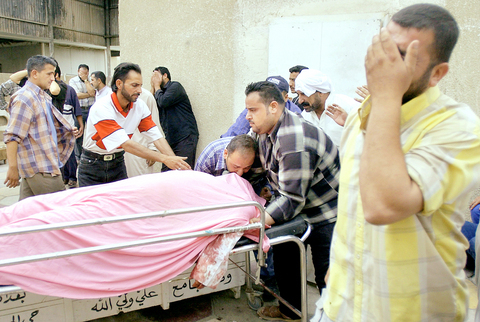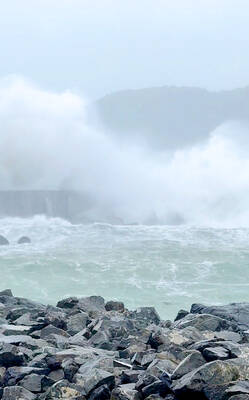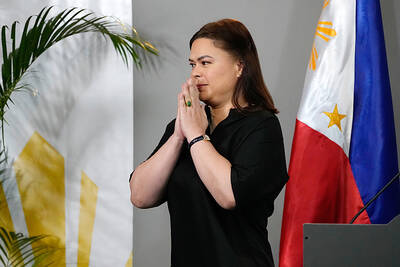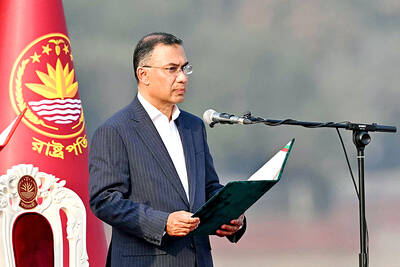Civilians shopping at street markets, worshipping at mosques and mourning at funerals have become the prime target of insurgents in a two-week spree of carnage that many people think is linked to efforts by foreign extremists to plunge Iraq into civil war.
At least 489 people, most of them civilians, have been killed by bombings and other insurgent attacks since Iraq's new government was announced by Prime Minister Ibrahim al-Jaafari on April 28.
Now, with the bodies of 50 men found shot to death by unknown assailants and dumped across the country over two days, fears are rising that foreigners like Abu Musab al-Zarqawi may be making headway in their campaign to turn Iraq's fractious communities against each other.

PHOTO: AP
There are worries the unexplained killings in Baghdad and other cities could be a result of angry Shiite and Sunni Muslims retaliating against each other's communities in frustration over two years of unrelenting insurgent attacks.
Religious leaders also have been singled out. Shiite cleric Qassim al-Gharawi died in a drive-by shooting in western Baghdad last week. Quraish Abdul Jabbar, a Sunni cleric, was reported shot dead and his body dumped behind a mosque in northeastern Baghdad on Monday.
"We are approaching a situation that is unstable, of a war of all against all, complete chaos, where the government is ineffective, the security is ineffective, and anybody can be killed at any time by anybody," said Kenneth Katzman, an expert on the Persian Gulf region with the US Congressional Research Service.
The Jordanian-born al-Zarqawi, leader of al-Qaeda in Iraq, made his intentions clear in a letter obtained and released last year by the US government saying that causing sectarian fighting between Shiite and Sunni was the best way to undermine US policy in Iraq.
Most of the insurgent attacks aimed at civilians have been in neighborhoods whose residents are predominantly from Iraq's Shiite Arab majority or their Kurdish allies. Many insurgents are thought to be from the formally dominant Sunni Arab minority, but many Iraqis blame foreign extremists for the assaults on civilians.
"This shows that the terrorists are in their last period. They weren't able to violate the security zone and therefore they started targeting schools, markets in order to kill civilians," the new defense minister, Saadoun al-Duleimi, said at a news conference Monday.
Al-Duleimi, a Sunni Arab, said insurgents killed 230 civilians last week alone, while only 13 Iraqi soldiers and policemen were slain.
The government's efforts to quell insurgent violence and keep Iraq's religious and ethnic communities from splitting could be complicated by the close relationship between the Interior Ministry, headed by Shiite leader Bayan Jabr, and the Badr Brigades, the militia of Iraq's leading Shiite group, the Supreme Council of the Islamic Revolution in Iraq.
Concern was raised when the militia, once regarded as terrorist by US officials, cooperated with security forces to capture four Palestinians and an Iraqi wanted for a bombing Thursday that killed at least 17 people at market in a Shiite neighborhood of Baghdad.
Al-Duleimi, the defense minister, has said he won't merge militias such as the Badr Brigades and the Kurdish Peshmerga into Iraq's army. The US has called for the militias to be disbanded.
Despite the violence and communal frictions, Katzman, the analyst at the Congressional Research Service, doesn't yet see Iraq tumbling into a sectarian war.
"Some would define this as some kind of civil war, but we don't yet have entire distinct camps across the country opposing each other," he said.
Iraq's influential Shiite leaders, particularly Grand Ayatollah Ali al-Sistani, are also playing a key role in tamping down resentments that could erupt into civil war.
One factor working against the effort by foreign extremists to foment civil war is the widespread belief among Iraqis that homegrown anti-US insurgents, either fervent nationalists opposed to foreign occupation or former Saddam loyalists angered by their fall from power, would not turn their weapons on fellow Iraqis.
So many Iraqis aim their anger over the attacks at foreign extremists and allied Iraqis who follow the puritanical Wahhabi sect of Sunni Islam.
"Civilians are always going to the easiest targets, and the Islamic extremists coming into the country are using them to try torpedo Iraq's political process," said Ismael Zayer, editor-in-chief of the Iraqi newspaper Al-Sabah al-Gadeed.
"Civil war is the only scenario they have," Zayer said of the foreign terrorists. "These people have nothing else."

Heavy rain and strong winds yesterday disrupted flights, trains and ferries, forcing the closure of roads across large parts of New Zealand’s North Island, while snapping power links to tens of thousands. Domestic media reported a few flights had resumed operating by afternoon from the airport in Wellington, the capital, although cancelations were still widespread after airport authorities said most morning flights were disrupted. Air New Zealand said it hoped to resume services when conditions ease later yesterday, after it paused operations at Wellington, Napier and Palmerston North airports. Online images showed flooded semi-rural neighborhoods, inundated homes, trees fallen on vehicles and collapsed

‘COST OF DEFECTION’: Duterte’s announcement could be an effort to keep allies in line with the promise of a return to power amid political uncertainty, an analyst said Philippine Vice President Sara Duterte yesterday announced she would run for president of the Southeast Asian nation of 116 million in 2028. Duterte, who is embroiled in a bitter feud with Philippine President Ferdinand Marcos Jr, was impeached last year only to see the country’s Supreme Court throw the case out over procedural issues. Her announcement comes just days before her father, former Philippine president Rodrigo Duterte, begins a pretrial hearing at the International Criminal Court (ICC) in the Netherlands over crimes against humanity allegedly committed as part of a brutal crackdown on drugs. “I offer my life, my strength and my future

NOT YET THERE: While the show was impressive, it failed to demonstrate their ability to move in unstructured environments, such as a factory floor, an expert said Dancing humanoid robots on Monday took center stage during the annual China Media Group’s Spring Festival Gala, China’s most-watched official television broadcast. They lunged and backflipped (landing on their knees), they spun around and jumped. Not one fell over. The display was impressive, but if robots can now dance and perform martial arts, what else can they do? Experts have mixed opinions, with some saying the robots had limitations and that the display should be viewed through a lens of state propaganda. Developed by several Chinese robotics firms, the robots performed a range of intricate stunts, including martial arts, comedy sketches and choreographed

POST-UPRISING: Bangladesh Nationalist Party lawmakers were yesterday expected to formally elect Tarique Rahman as their leader and new head of government Bangladesh’s prime minister-to-be Tarique Rahman and lawmakers were yesterday sworn into parliament, becoming the first elected representatives since a deadly 2024 uprising. Rahman is set to take over from an interim government that has steered the country of 170 million people for 18 months since the autocratic government of Sheikh Hasina was overthrown. The lawmakers, who promised loyalty to Bangladesh, were sworn in by Chief Election Commissioner AMM Nasir Uddin. Bangladesh Nationalist Party (BNP) lawmakers are expected to formally elect Rahman as their leader, with President Mohammed Shahabuddin then to administer the oath of office to the prime minister and his ministers